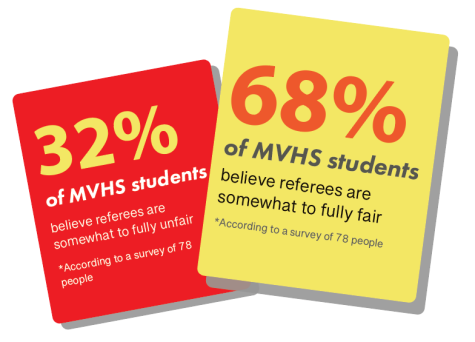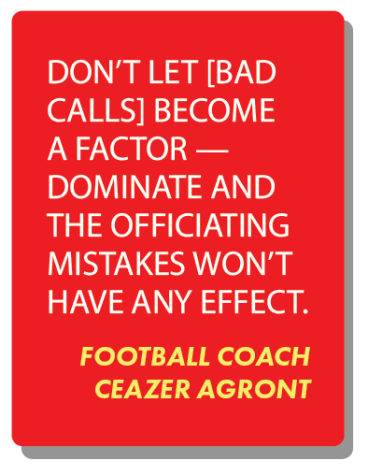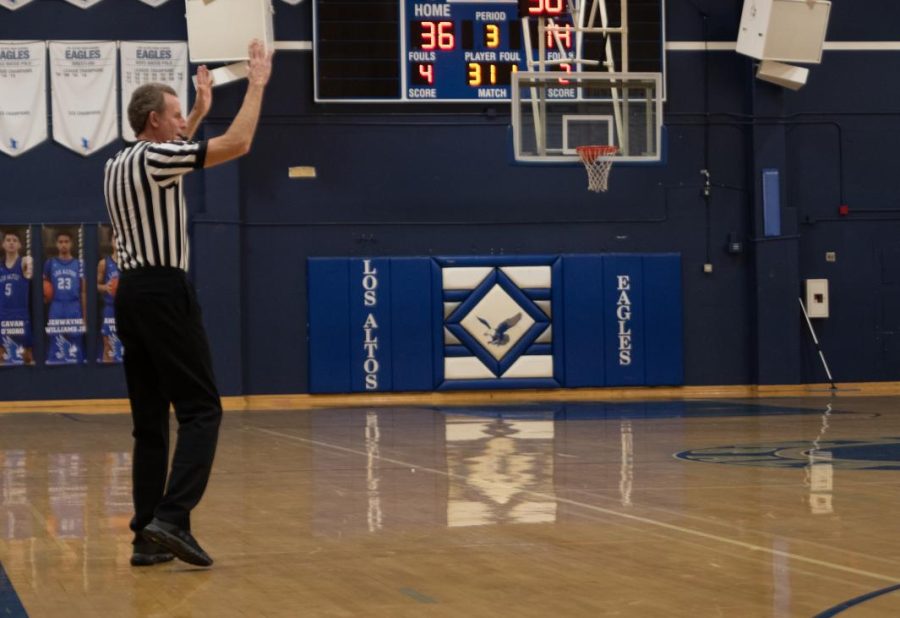Setting the guideline
Exploring student athletes experiences with referees
Basketball referee Scott Calvin calls a time out.
February 28, 2023
Junior Jennifer Long bites back her frustration as the referee blows the whistle once again. She knows the call signals the end of the JV Girls Volleyball team’s short-lived lead. Although there was no doubt in her mind that her team was better, there was one thing holding them back: the referee. Long says she was calling them on every single point, every single line — calling double touch lines, netting, everything, even when Long was certain her teammates had done nothing wrong.
“We shouldn’t have lost,” Long said. “The referee making bad calls just makes the entire team feel unmotivated because we’re like, ‘The referee is so biased towards the other team, there’s no way we can win this’ and we just stopped trying after the second or third [set].”
Senior Kyle Wong recalls a similar experience with a referee who made several unfavorable calls during soccer nationals with his club team. After his teammate swore at the referee after a call and ended up with a yellow card, for the rest of the game, Wong felt the referee was working against them.
“[The referees] try their best, [but] at the end of the day, they’re amateur referees,” Wong said. “So there’s only so much they can do. We can’t expect them to be perfect.”

Head football coach Ceazar Agront says that throughout his many years of coaching, he’s noticed clear bias from a few referees, which is often exacerbated by conflicts with the teams. He admits that in his early career as a coach, he too would often argue with referees.
“When I was younger, I would scream and go crazy,” Agront said. “Now, what I try to do is to have some composure and approach the referees in a civil manner and have a conversation about it. These guys are getting yelled at all the time. If you’re a referee, [wouldn’t you] feel ticked off [if] a coach was yelling at you too much and embarrassing you, making you feel flustered in front of everyone? I can start to see it on some of these refs’ faces and then all of a sudden you start seeing it — they start [thinking], ‘I’m just calling everything against you.’”
High school basketball referee Scott Calvin admits that refereeing can often be frustrating when spectators constantly argue with his calls. He’s seen several people in his field quit due to the stress of the job. Nonetheless, Calvin feels confident in his calls.
“If you were sitting at your desk at work Monday through Friday, nine-to-five and there was somebody in the next room yelling, ‘You have to be consistent,’ ‘You suck, ref’ or ‘That’s a foul ref’ at you from the next office — think about how that wouldn’t make you feel [great],” Calvin said. “[But] my motto is, as sports officials, knowledge of the rules equals confidence on the court. I always like to emphasize to our staff of officials that we have to be rules experts. If you talk to a coach or a player using the language of the rules, then they really can’t disagree with your explanation, they can just disagree with your judgment on a particular play.”
As an experienced referee, Calvin has gotten used to the fans yelling and is usually able to ignore it. While Calvin acknowledges referees can make mistakes when calling fouls, especially if they don’t have a clear view of the play, he notes that with time, referees learn to anticipate plays and contact. While the referee has to “just live with” the impact of their missed call, they will often admit their errors to the coach.
Agront and has experienced referees being more sympathetic after he explained his side. Once, one of his players received a personal foul for roughing the opposing team’s quarterback. Agront described the player as having behavioral issues and special needs that he was working through. So when the referee threw a flag, the athlete did not understand what was happening, as it was the first game of the season. While the referee gave the player a personal foul, Agront went to talk to the kid about what had transpired and explained the player’s situation to the referee, who understood the situation and waved the personal foul off. Agront believes that had he gone up and yelled at the referee rather than approaching the situation calmly, the end result would have likely not been in his favor.
Similarly, Long notices that in close calls referees are more likely to support her team if her team treated them with kindness and respect. When playing a game with a referee that Long and her team had treated kindly, the referee was unsure whether Long had stepped on the line while serving or not. The referee ended up choosing not to call it, and Long believes the main reason is due to her team’s treatment of them.
Agront recognizes that referees will sometimes make bad calls, but believes that if a few calls make a major difference in the game, then the team wasn’t doing something right — a few calls are no reason to argue or yell at the referee.

“There could be honest mistakes that the [referee] just doesn’t have experience [with],” Agront said. “Don’t let that become a factor — dominate [the game] and hopefully the officiating mistakes won’t have any real effect on that. A couple bad calls here and there [don’t matter] — they would have to be calling everything for it to change a team that’s dominating in all facets of the game.”
He believes that although referees may sometimes make mistakes with calls, they are imperative to a team’s ability to play the game and deserve respect.
“Without a [referee] you can’t play the game,” Agront said. “It’s easy to get frustrated when they made a bad call, or they called you for something that you feel like you didn’t do, [but] you need refs for a fair game, so you need to be able to learn how to coexist with them.”



















